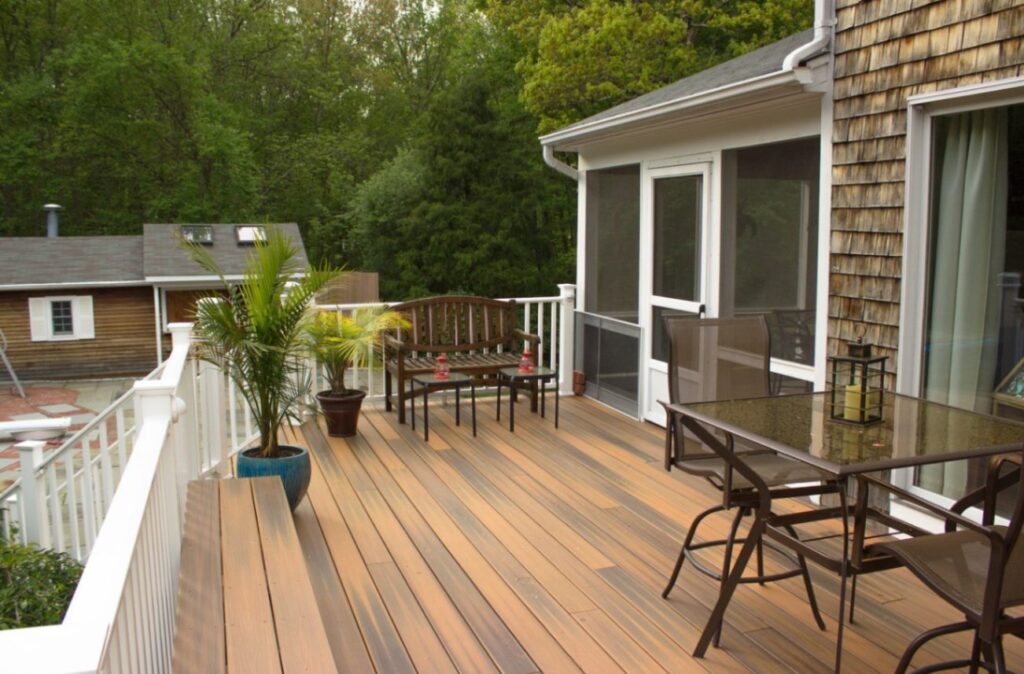Westchester's climate poses unique challenges for your deck, from high humidity that can warp wood to harsh winter conditions that lead to ice buildup. These factors can compromise both the aesthetics and durability of your outdoor space. Understanding how these elements interact with your deck materials is essential. So, what can you do to protect your investment and guarantee its longevity? Let's explore the key considerations and solutions for maintaining a resilient deck in this environment. Have you ever noticed how humidity can impact your deck's appearance and longevity? In Westchester's humid climate, excess moisture absorption can lead to significant issues for your deck. When wood absorbs moisture, it swells, causing warping and cracking over time. This not only detracts from your deck's aesthetic but also compromises its structural integrity. Additionally, high humidity creates a perfect breeding ground for mold growth, which can spread rapidly and stain the surface. Once mold takes hold, it can be tough to remove and might require professional cleaning. To protect your deck, consider using sealants that resist moisture and regularly inspect for signs of mold. Staying proactive can help maintain your deck’s beauty and durability despite humidity challenges. Sunlight can be both a friend and foe to your deck. While it provides warmth and enjoyment, those UV rays can wreak havoc over time, causing fading and damage. Without proper UV protection, the vibrant color of your deck can quickly diminish, leading to an unappealing, worn look. This fading isn’t just cosmetic; it can also weaken the wood, making it more susceptible to moisture and rot. To combat this, consider investing in high-quality deck coatings specifically designed to block UV rays. These coatings not only preserve your deck’s appearance but also extend its lifespan. As winter settles in, snow and ice can pose significant challenges for your deck. The weight of snow accumulation can strain your deck’s structure, potentially leading to sagging or even collapse if it’s not designed to bear such loads. Additionally, when temperatures fluctuate, ice melting can create issues as it seeps into cracks and joints. This freeze-thaw cycle can weaken the materials and cause further damage over time. You might notice unsightly stains or even mold growth as melting ice lingers. To protect your investment, regularly clear snow from your deck and guarantee proper drainage to prevent ice from forming. By being proactive, you can help maintain your deck's integrity throughout the harsh winter months. After weathering the challenges of winter, your deck needs attention to secure its longevity. Start by employing effective cleaning techniques to remove dirt, mold, and mildew. A power washer can work wonders, but be cautious not to damage the wood. Follow up with a thorough inspection for any signs of damage or wear, especially around joints and railings. Once cleaned, consider applying protective coatings. These not only improve the deck’s appearance but also provide a barrier against moisture and UV rays, essential in Westchester’s climate. Choose a high-quality sealant to guarantee durability. Regularly maintaining your deck through these steps will keep it looking great and extend its life, allowing you to enjoy your outdoor space for years to come. When selecting materials for your deck in Westchester's diverse climate, you need to take into account both durability and aesthetics. Composite decking is an excellent choice, as it withstands harsh weather, resists fading, and requires minimal maintenance. It combines wood fibers and recycled materials, offering a sleek look without the drawbacks of natural wood. On the other hand, if you prefer the classic appeal of natural wood, opt for rot-resistant species like cedar or redwood. These materials provide warmth and beauty but do require regular sealing and treatment to combat moisture and pests. Ultimately, balancing your preference for aesthetics with the practicalities of Westchester's climate will lead you to the right material for your deck. You should inspect your deck at least twice a year, ideally during seasonal maintenance. This guarantees you catch any damage early, keeping your structure safe and prolonging its lifespan. Regular deck inspection frequency is key! You should watch for deck discoloration signs, like fading or dark spots, and loose boards indicators, such as creaking sounds or movement. These issues can compromise safety and indicate it’s time for repairs or maintenance. You can paint your deck in winter, but you’ll need to take precautions. Follow deck maintenance tips, ensuring temperatures stay above 50°F. Cold weather can affect paint adhesion, so choose the right products and timing. The best time for deck sealing is during warm, dry weather, ideally in late spring or early fall. Following seasonal deck care and deck maintenance tips guarantees lasting protection against moisture and UV damage. To properly clean your deck, use effective deck cleaning techniques with eco-friendly cleaners. Start by sweeping debris, applying the cleaner, scrubbing stubborn stains, and rinsing thoroughly. This keeps your deck looking great while protecting the environment. In Westchester, your deck faces unique challenges from humidity, UV rays, and winter weather. By staying proactive with regular maintenance and choosing durable materials like composite decking, you can protect your investment and improve your outdoor space. Don't wait for visible damage to take action—implementing seasonal care now will guarantee your deck remains beautiful and sturdy for years to come. Embrace these strategies, and enjoy your deck regardless of what Mother Nature throws your way!
Key Takeaways
The Effects of Humidity on Your Deck's Material
How UV Rays Can Cause Deck Fading and Damage
Winter Weather Woes: Snow, Ice, and Their Impact
Seasonal Maintenance Tips for Deck Longevity
Choosing the Right Materials for Westchester's Climate
Frequently Asked Questions
How Often Should I Inspect My Deck for Damage?
What Are Signs My Deck Needs Repair?
Can I Paint My Deck in Winter?
What Is the Best Time for Deck Sealing?
How Do I Properly Clean My Deck?
Conclusion